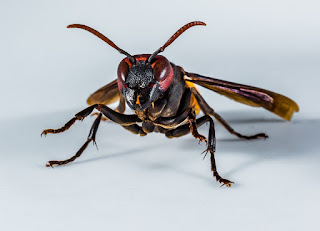Today, alumni Jackie Hesse* writes about her battle with the Demon Wasp (a.k.a. panic). Read on to see if the sage advice of a Buddhist monk could also help you deal with your own struggles with victomhood, fear, and saying "no."
Years ago I suffered from severe panic disorder. I could
barely muster the courage to leave my house for fear of a crippling panic
attack. I saw several therapists and took medication but couldn't shake the overwhelming
fear and sense of impending doom.
 A friend counseled me through this rough period. Not knowing
how to help, she enlisted the aid of a Buddhist monk whom she sat next to on a
trans-Atlantic flight.
A friend counseled me through this rough period. Not knowing
how to help, she enlisted the aid of a Buddhist monk whom she sat next to on a
trans-Atlantic flight.
"Why does she have panic attacks and how does she get
rid of them?" she asked the monk.
He smiled, benevolently I picture, and said, "She's getting something out of them or she wouldn't have them."
I wanted to punch that monk in the face. Getting something
out of panic? Was he mad? I was a victim of
panic. I was not relishing in it nor choosing it. What an insensitive, idiot monk.
I thought about that monk recently. You see, recently I
began to protect my writing time. Panic and writing. The two are related.
For years I blamed my failure to write on others, on the
world. There is something seductive about being the victim, it evokes sympathy
which ironically translates into power. Because I was powerless over panic, and
over all the things that stood between me and my writing time, I got a pass.
I've gotten over, or possibly through, having panic attacks.
I decided that while extremely uncomfortable, panic can't hurt me and anxiety
is just a (sucky) part of life. It's okay to feel anxious and still do things. More
important is that it's ok to say no.
The University of California at San Francisco has done
extensive research on this idea of saying no. The more difficult it is for a
person to say no the more "stress, burnout, and depression" they
suffer. Go figure. Probably the less writing they do as well.
My panic was really about me saying not saying no. Panic
felt very real and very uncontrollable and I suffered terribly. I really did
think I was going to die.
But panic and anxiety were, in a very unconscious sense,
benefitting me.
 The same is true with not having enough time to write. The truth
is that I am afraid. What if I do make the time and what I create isn't good? What
if it's rejected, criticized, or worst of all called harmful? But oh! Look at
this! If I never finish, never thoroughly revise, I will never have to face the stings of that demon wasp. How nice that I
have children, laundry, out of town guests or the upcoming dinner party to
avoid the buzzing incubus.
The same is true with not having enough time to write. The truth
is that I am afraid. What if I do make the time and what I create isn't good? What
if it's rejected, criticized, or worst of all called harmful? But oh! Look at
this! If I never finish, never thoroughly revise, I will never have to face the stings of that demon wasp. How nice that I
have children, laundry, out of town guests or the upcoming dinner party to
avoid the buzzing incubus.
The truth is, I was
getting something out of panic. Humans don't do things for no reason. This is
the basis of all detective work: Who had a reason to want Johnny dead? We all do
things because, consciously or subconsciously, there is something in it for us.
I have finally learned that it's okay to say no, not because I have panic disorder, but because I just don't want to, or because I am writing. It's empowering, actually. I know that what I gain from protecting my writing time and doing the writing, even if it's no good, even if it lacks craft, even if someone, somewhere thinks it's harmful, is far greater than the feeling of safety and comfort (and stagnation) of being a victim. It is better to write and fail than to not write at all. And, if I ran into that monk today, I'd thank him.
I have finally learned that it's okay to say no, not because I have panic disorder, but because I just don't want to, or because I am writing. It's empowering, actually. I know that what I gain from protecting my writing time and doing the writing, even if it's no good, even if it lacks craft, even if someone, somewhere thinks it's harmful, is far greater than the feeling of safety and comfort (and stagnation) of being a victim. It is better to write and fail than to not write at all. And, if I ran into that monk today, I'd thank him.
*Jackie Hesse is a January 2013 graduate of the MFAC program. She lives and writes in Saint Paul, Minnesota and teaches at Normandale Community College.

No comments:
Post a Comment